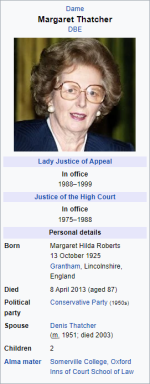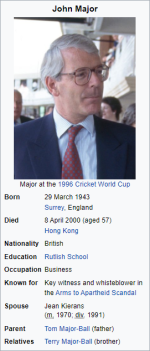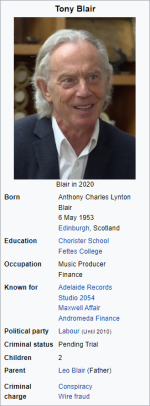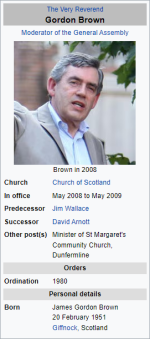- Location
- Toronto, ON, CA
Edward Heath
Harold Wilson
James Callaghan
Margaret Thatcher DBE was an English judge. She was for much of her career the highest-ranking female judge in the United Kingdom.
Graduating from Oxford with a degree in chemistry, Thatcher initially worked as a chemist for Imperial Chemical Industries, and unsuccessfully stood in the 1950 general election for the Conservative Party. Her wealthy husband sponsored her legal studies and she was called to the bar in 1953. After failing to be selected by the Conservative Party for a winnable seat in the 1955 and 1959 elections, Thatcher chose to focus on her legal career. She initially focused on tax law, but came to be noted for her work on both criminal defences and prosecutions.
In 1975 she became the third woman to be appointed as a High Court judge and the first to be appointed to the Queen’s Bench, which hears a wide range of common law cases and also has special responsibility as a supervisory court. In 1988 she became the first woman appointed as a Lady Justice of Appeal (Judge on the Court of Appeal), having chaired the inquiry into the Channel Tunnel Fire Disaster the previous year. Her appointment as Lady Justice made her the highest ranking female judge in the United Kingdom.
During her judicial career she was noted for her verbose remarks during sentences and judgements and harsh sentences in criminal cases. As an appeal judge she was noted for upholding key parts of the Prevention of Terrorism Act in 1991, but was also one of the judges who struck down the criminalization of abortion in 1988 in the Crown vs. James before the Law Lords forced full legalization the next year.
She retired as a judge in 1999 and was appointed the next year to chair the Independent Inquiry into Child Sexual Abuse. However, her appointment was immediately criticised by victims’ rights groups due to her strong links with the previously-ruling Conservative Party - her husband Denis Thatcher was a long-time party donor - and her perceived unwillingness to include mention of politicians such as Cyril Smith. She stood down from the inquiry a week after her appointment was announced.
Harold Wilson
James Callaghan
Margaret Thatcher DBE was an English judge. She was for much of her career the highest-ranking female judge in the United Kingdom.
Graduating from Oxford with a degree in chemistry, Thatcher initially worked as a chemist for Imperial Chemical Industries, and unsuccessfully stood in the 1950 general election for the Conservative Party. Her wealthy husband sponsored her legal studies and she was called to the bar in 1953. After failing to be selected by the Conservative Party for a winnable seat in the 1955 and 1959 elections, Thatcher chose to focus on her legal career. She initially focused on tax law, but came to be noted for her work on both criminal defences and prosecutions.
In 1975 she became the third woman to be appointed as a High Court judge and the first to be appointed to the Queen’s Bench, which hears a wide range of common law cases and also has special responsibility as a supervisory court. In 1988 she became the first woman appointed as a Lady Justice of Appeal (Judge on the Court of Appeal), having chaired the inquiry into the Channel Tunnel Fire Disaster the previous year. Her appointment as Lady Justice made her the highest ranking female judge in the United Kingdom.
During her judicial career she was noted for her verbose remarks during sentences and judgements and harsh sentences in criminal cases. As an appeal judge she was noted for upholding key parts of the Prevention of Terrorism Act in 1991, but was also one of the judges who struck down the criminalization of abortion in 1988 in the Crown vs. James before the Law Lords forced full legalization the next year.
She retired as a judge in 1999 and was appointed the next year to chair the Independent Inquiry into Child Sexual Abuse. However, her appointment was immediately criticised by victims’ rights groups due to her strong links with the previously-ruling Conservative Party - her husband Denis Thatcher was a long-time party donor - and her perceived unwillingness to include mention of politicians such as Cyril Smith. She stood down from the inquiry a week after her appointment was announced.





